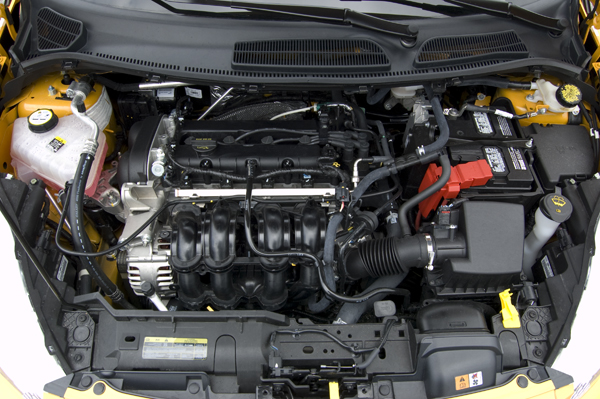Top Ford Fiesta Engine Repairs to Avoid Costly Damage
Top Ford Fiesta Engine Repairs to Avoid Costly Damage
Blog Article
Unlocking the Power of Engines: A Comprehensive Overview to Performance and Effectiveness
Recognizing the intricate mechanics of engines is important for both efficiency fanatics and day-to-day vehicle drivers. The solutions might redefine our strategy to engine efficiency and performance in ways that are both enlightening and crucial.
Recognizing Engine Essentials
What comprises the essential mechanics of an engine? At its core, an engine is a machine created to convert fuel right into mechanical power via a series of controlled explosions or burning processes.
The crankshaft then transforms this direct movement right into rotational energy, which inevitably powers the car. The camshaft regulates the opening and closing of the valves, controling the consumption of air and fuel and the expulsion of exhaust gases. Furthermore, the engine relies upon a thoroughly adjusted fuel-air mixture, ignition system, and cooling system to ensure ideal efficiency and efficiency.
Comprehending engine essentials also includes identifying the importance of engine cycles, such as the four-stroke cycle, that includes intake, exhaust, compression, and power strokes. Each stage is crucial in making sure the engine functions efficiently and efficiently. Mastery of these basic mechanics prepares for discovering extra complex engine characteristics and efficiency metrics, important for enhancing both power output and effectiveness.
Key Efficiency Metrics
Key efficiency metrics are essential for reviewing an engine's performance and power result, giving beneficial understandings for both customers and suppliers. These metrics work as standards for engine efficiency, enabling notified decisions in layout, getting, and manufacturing.
Among the primary metrics is horsepower, which evaluates the engine's capacity to carry out work over time. Torque, determined in pound-feet, is one more crucial statistics that shows the engine's rotational pressure, straight affecting acceleration and lugging ability. Fuel efficiency, typically determined in miles per gallon (MPG) or litres per 100 kilometers (L/100km), analyzes how properly the engine converts gas right into movement, affecting operational expenses and ecological factors to consider.
In addition, thermal efficiency procedures how well an engine transforms gas power right into valuable job, exposing insights right into power losses mostly via warmth. Exhaust degrees, including CO2 and NOx, are also essential, reflecting the engine's environmental effect and compliance with governing requirements.

Tuning Strategies for Efficiency
Tuning methods play a substantial function in improving engine effectiveness by enhancing performance metrics determined in earlier conversations (ford fiesta engine). Various approaches exist to adjust an engine, each adding to improved fuel economic climate and minimized emissions
One effective method is adjusting the air-fuel ratio, ensuring the engine operates within the optimum burning regimen. A leaner mixture can improve gas performance, yet it has to be balanced to stop misfires or engine knock. Additionally, reprogramming the engine management system can recalibrate criteria such as ignition timing, which better boosts efficiency while preserving power result.
Another important strategy entails modifying the intake and exhaust systems. Upgrading to high-performance air filters and exhaust headers can lower back pressure, assisting in far better air flow. This allows the engine to take a breath even more freely, leading to enhanced combustion performance.
Moreover, the implementation of innovative adjusting tools, like dyno screening, supplies precise data that enables targeted modifications. Regularly monitoring these efficiency metrics makes sure that adjusting efforts yield the desired performance end results. Jointly, these methods not only reinforce engine performance however additionally add link to lasting sustainability in engine procedures.
Upkeep for Optimal Efficiency
Normal engine upkeep is crucial for attaining ideal efficiency and longevity. A well-maintained engine not only operates effectively yet likewise minimizes the threat of pricey repairs and failures. Key components needing regular attention consist of oil, filters, belts, and ignition system.
Altering the engine oil at advised periods is essential, as oil click this link lubes moving components and prevents getting too hot. Similarly, replacing oil and air filters ensures that impurities do not harm engine function. Neglecting these elements can bring about lowered performance and possible engine damages.
Additionally, evaluating and changing worn belts and hose pipes is important to stop abrupt failures. Timing belts, in certain, should be replaced according to the producer's routine to avoid catastrophic engine damage.
Glow connects should additionally be examined and replaced as necessary, considering that they play a vital function in ignition and gas performance.
Future Patterns in Engine Modern Technology
Embracing improvements in technology, the future of engine layout is poised to change performance and efficiency across various applications. Crossbreed and completely electric powertrains are coming to be significantly conventional, using reduced exhausts and enhanced gas performance.
Additionally, innovations in products scientific research are resulting in lighter, stronger parts that enhance engine performance while reducing energy intake. Advanced production strategies, such as 3D printing, permit for the development of complex geometries that enhance airflow and thermal administration, therefore maximizing burning procedures.
In addition, the integration of synthetic knowledge and equipment learning is readied to transform engine diagnostics and efficiency tuning. These modern technologies can analyze large amounts of information in actual time, making it possible for predictive upkeep and tailored efficiency enhancements.
Verdict
In conclusion, unlocking the power of engines needs a detailed understanding of their auto mechanics and efficiency metrics. Carrying out efficient tuning methods and sticking to routine maintenance methods significantly enhance engine abilities.
In addition, the engine counts on a carefully adjusted fuel-air mixture, ignition system, and cooling down system to make sure optimal performance and efficiency.
Comprehending engine basics additionally entails acknowledging the relevance of engine cycles, such as the four-stroke cycle, which includes intake, exhaust, power, and compression strokes. Mastery of these essential mechanics lays the groundwork for discovering more complex engine characteristics and performance metrics, necessary for optimizing both power output and performance.

Accepting innovations in technology, the future of engine style is poised to reinvent efficiency and performance throughout different applications.
Report this page